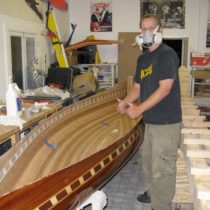Landscape Architecture for Landscape Architects › Forums › PROFESSIONAL PRACTICE › State of the Profession
- This topic has 1 reply, 39 voices, and was last updated 14 years, 4 months ago by
 nca.
nca.
-
AuthorPosts
-
April 25, 2010 at 2:46 pm #170093
 Andrew Garulay, RLAParticipant
Andrew Garulay, RLAParticipantIt is not completely symbiotic. We are part of the free market whether we like it or not. No one in the free market should be oblivious to responsibility or not apply their own values whenever possible. Most people in any endeavor do not behave badly, but a few do – that goes for LAs as well.
I think the statistics will show, and I don’t even know why I have to point this out, that LAs work a lot when a lot of development is going on and don’t work so much when it is not. The dirty little secret is that our profession is the design of development on the land.
Is all development on the land irresponsible? I don’t think so. I do think that many of us in our profession have been conditioned to put a connotation on the word “development” of only pertaining to bad projects or projects done by exploitive people.
April 25, 2010 at 7:47 pm #170092 Andrew Garulay, RLAParticipant
Andrew Garulay, RLAParticipantWhy are you afraid to use the word development? … are we programed to feel dirty if we work in “development”?
April 25, 2010 at 11:34 pm #170091 ncaParticipant
ncaParticipantwell, i think the word development in the context of land issues implies building and paving, vertical construction, highways, gas stations, and irrigated lawns. In essence, it’s a one dimensional, one-directional verb whereas ‘improved land’ may be more multi-directional in the sense that we can improve the value of something, in this case land, by reclamation and mitigation for instance.
I think NR’s thought is more in line with progressive thinking about land development even if it is still ‘development’ because it evokes the question–Are we really improving the value in XX project? In other words, is the gas station a fair and even trade for the virgin prairie, for instance even though by definition it is ‘development’?
Andres Duany was quoted saying something to the tune of, and I’m paraphrasing, ‘the only fair trade for a farm is a village.’
I believe that, especially coming from a man who’s business is especially dependent upon ‘development.’
April 26, 2010 at 12:08 am #170090Mark Sanford
Participanti was around a friend of mine just yesterday who is about to graduate. He told me that out of the 42 people graduating only 2 people have jobs lined up. I am employed with a landscape contractor but unable to find design work and work with an LA…. therefore no license…..
April 26, 2010 at 2:46 am #170089 ncaParticipant
ncaParticipantI agree, but I also think the connotations go beyond semantics and sensitivity to certain verbage.
When we say ‘development’ we all know what we’re talking about–houses, streets, bridges, highways, gas stations, strip malls, and yes…even parks. But I think we all also know that the old way of thinking about ‘development’ is based on false pretenses dating back several decades and the cultural mores are shifting whether regardless of how we align ourselves professionally.
Again, I think it’s about more than offending a certain group or hitting someone’s ‘hot-button.’
The bottom line is for me that I dont think we need to be the developers errand boy. I think there are a number of things that would need to change simultaneously for the developer-architect paradigm to completely shift and a lot of them have little to do with landscape architecture.
I was also just thinking how so often the ‘developer’ is only a person with a bunch of money who wants to make more money–there are probably just as many independent land developers out there as thre are professional types–surgeons with a few million who want to do a project, etc. How does it make any sense in this instance to default all our expertise in land design and development to someone who is essentially an amateur? To me this is like showing up for surgery and telling the surgeon they should do what you tell them because you’re paying for the job. I think the general population is beginning to see that there is value in the legacy we leave on our land, just as important as how our ailments are treated at a physicains office.
April 26, 2010 at 2:53 am #170088 ncaParticipant
ncaParticipantTo answer Andrew’s questions–
Is all development on the land irresponsible?
No, but is most? Probably. How many 5 star island resorts in the south pacific do we need, especially now? How many drive-thru coffee shops and gas stations do we need? If there truly is demand, is it in our best interest as a society to keep repeating these patterns? Are we eating ourselves alive and we’re just so desparate as professionals that we allow it unwittingly?
April 26, 2010 at 11:50 am #170087 Andrew Garulay, RLAParticipant
Andrew Garulay, RLAParticipantWhy is it that it always is implied that if someone suggests that we need development to work, they are immediately for all of the worst rape and pillage of the land and the worst examples are brought out to make us look like evil people?
Do you work on anything other than converting toxic spaces back into habitat? I don’t get it.
I work on affordable housing projects, wetland restoration projects, raze and replacement of waterfront homes ( applying new more ecologically sensitive regulations and mitigation improving situations), some commercial redevelopment (also under new “greener” standards turning roofs and pavement to more open space and pervious surfaces), some wind turbine sitings and permitting, …. I’m not uncomfortable with that. All of it was for people making a profit.
I did convert a solid paved lot and bar into a Dunkin Donuts, but it is a lot greener with less runoff than before.
April 26, 2010 at 3:01 pm #170086 Ben YahrParticipant
Ben YahrParticipantStatistics are a measure of the past. If landscape architects accept the simplistic view that they are servants to developers, and cling to the mantra that more development is good just so that more people can work- the “state if the profession” is screwed.
Move on. Advocate, research, explore, discuss, find new niches, specialties, efficiencies, markets, clients, policies, better means and methods- most importantly keep an open mind.
Personally, I am not anti-development. But the development patterns of the past are dead, and hopefully they stay dead. I hope to be gainfully employed designing positive change on the land for the rest of my life- laying out suburban subdivisions and strip malls is not going to facilitate that goal.
In response to the original topic of the discussion, in general terms-
* Of the LAs you know, how many lost their jobs after the economy went bad? ~1/5th (not many)
* How many were practicing before the downturn, but are not right now? ~2/3rds(lots)
* How many of those who are practicing today are underemployed? Moderately or severely underemployed? Most
* Do you know of any that have closed their doors entirely? a fewApril 26, 2010 at 3:48 pm #170085 steve phillipsParticipant
steve phillipsParticipantLord! So many of these posts are so esoteric, like so many debates of the subtle nuances or the word “Development”. In this case, if you do not have the sense to use the right word to use to your specific audience, too bad. Ok, if you are addressing an angry mob of tree huggers, the word would denote something else than it would to a depressed, hungry, backwoods group. Furthermore, a developer would probably love the word, development. This is not even Speech 101, it is common sense. (Why debate it?)
The two biggest topics are the run-rampant, self serving academia and our identity crisis. Everybody knows this and it is not news. I am sure that the obvious is cliché so much that most people would rather discuss semantics. The real numbers of under and unemployment of L.As is so high 50%?, here in Florida, it is more like 75%. Would it not be prime time to revive these topics since we are not all working 75 hour weeks? We are perceived as unnecessary and frivolous and so misunderstood (again front page news). Let’s get a grip now! Forget about the DUIs now! (Designing Under the Influence) Let’s be positive in these dark times, it will give us hope. Drastic times call for drastic measures. We can deal with issues like semantic and the “landscape sluts” later.
The two biggest problems are:
1) Our self identity, even in good times, being a landscape architect often does not work. OK so let’s try something else. Time to reinvent ourselves, Completely. Even if we reinvented ourselves in name only, that would be a vast improvement.
2) ASLA. Could be wrong but shouldn’t they be the ones regulating and educating the public AND academia about our field? The ASLA is sick, time to send it to the vet or shoot it.
I suspect that most of us are ragged from beating our heads against the wall, the rest are in their egghead ivory towers debating semantics caught up in being intellectual, to impress others with their concepts and hey it works, they are smart and I am impressed. Unfortunately, most of us are not married to brain surgeons.
Everybody! I appeal to your common sense, channel your energies to the obvious problems. Disillusionment and bitterness or soft and cushy intellectual talk really do no one any good, our problems are in our face and are ugly, let‘s deal with them while there is time.
“If this is your best, it is no good, try doing your worst.” – Mae West
April 26, 2010 at 5:38 pm #170084 Andrew Garulay, RLAParticipant
Andrew Garulay, RLAParticipantI agree. I also believe that more know that cutting corners and/or not making for a good experience to the end user affects the bottom line just like over spending on things that won’t make a difference in the end user’s experience.
April 26, 2010 at 8:07 pm #170083 ncaParticipant
ncaParticipantUgh.
Yes, I get that our professionas are dependent, at least in large part, to development and the business of development whether we like it or not. I get it.
What I was trying to say in the last reply about things needing to change was essentially conceding to both your points. I was saying that greater mechanisms beyond the realm of landscape architecture and design would need to change operation before we see the kind of idealistic changes we all would probably prefer, ie vast economic, cultural, and political shifts that will probably never happen in our lifetime.
I work on all kinds of projects every day, including right now that I am morally at odds with. The only thing that keeps me doing this is that I think I can affect positive change in small increments by being good at what I do.
I’m asking you to step outside the professional/political sphere. I can only concede at this point that perhaps I am jaded by my own experience here in CO.
Is there not a bigger picture here? Do we only see what lands on our desks? I’m just asking the questions, I’m not trying to pose a new way of doing business.
Really I probably should have prefaced the questions above with another question,–do we give a damn about the land for any purpose other than to make a profit?
April 26, 2010 at 8:14 pm #170082 ncaParticipant
ncaParticipantI dont think it’s necessarily about being totally against development as it is against the status quo, for me anyway.
I think defaulting our reason and logic to money is a cop-out. I’m sure you’re smarter than that NR.
April 26, 2010 at 8:17 pm #170081 ncaParticipant
ncaParticipantI’ll admit this was probably a bad question–
Are we eating ourselves alive and we’re just so desparate as professionals that we allow it unwittingly?
But really, if all we’re after is convenience and profit, then what do we have left as a society? There is no intervention or mitigation big enough to put a silver lining on that cancer.
April 27, 2010 at 1:31 am #170080 Jon QuackenbushParticipant
Jon QuackenbushParticipantright on man…
April 27, 2010 at 1:32 am #170079 Andrew Garulay, RLAParticipant
Andrew Garulay, RLAParticipantI don’t think there is this big bad statusquo. Things are always changing and I have seen nothing but improvement in how we handle the environment and development over the course of my lifetime. Negativity and paranoia run rampant despite the fact that we are constantly improving every day (landscape architects AND everyone else).
Each project is an opportunity to make an impact. Every project that is not done IS maintaining the status quo.
Yes, there has been more land developed, but it is done much better now than a few years ago and a hell of a lot better than many years ago.
We can have it both ways. We can develop land, particularly re-develop land, in positive ways. When we do, we not only work and have jobs as well as others, but something is getting built to fill a need. If there was no need there would be no profit for the developer. The need is usually that of us regular folks to have either a home, a place to get goods or services, or a place for entertainment, or a place to house manufacturing or off site services. ….even greedy pigs don’t build things that no one else values orthey would not get any money out of it. … you don’t see them building much of anything right now, do you?
We are over built for the moment. It happens in cycles. This last growth cycle went too long and will take longer for us as a nation to swell our needs back up. If half of us decide to farm their backyards, live in tents, and ride bicycles everyday it will take way longer.
-
AuthorPosts
- You must be logged in to reply to this topic.


